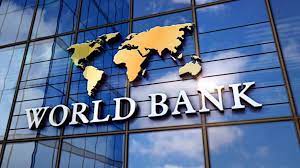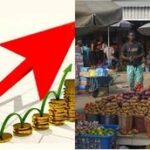The World Bank has projected Nigeria’s inflation to drop to 15.1% by 2026.
In a report by the World Bank titled “African Pulse,” Nigeria’s economic outlook was examined, with a focus on inflation and growth projections.
Join our WhatsApp ChannelAccording to the World Bank, Nigeria’s inflation rate is anticipated to decrease to approximately 24.8% this year, with further declines expected to around 15.1% by 2026.
The World Bank attributed this projected decline to monetary policy tightening and exchange rate stabilization measures implemented in Nigeria.
“Growth in Nigeria is projected at 3.3% in 2024 and 3.6% in 2025–26 as macroeconomic and fiscal reforms gradually start to yield results. Structural reforms will be needed to foster higher growth,” stated the World Bank in its report.
However, the World Bank highlighted concerns regarding the slow growth of Nigeria’s non-oil sector, emphasizing the necessity of implementing adequate structural reforms to stimulate growth. The report noted that Nigeria’s growth projections lag behind those of its peers in West and Central Africa.
In analyzing the causes of inflation in Sub-Saharan Africa (SSA), the World Bank identified elevated food prices and local currency weakness as major contributors. Adverse climatic conditions such as El Nino weather patterns and flooding, along with geopolitical tensions in regions like the Middle East and Europe, were cited as factors driving high food inflation across SSA.
READ ALSO: Nigeria Seeks Fresh $1.5bn World Bank Aid To Tackle Forex Crisis
Nigeria has been grappling with rising inflation rates, reaching 31.70% in February 2024, according to the National Bureau of Statistics (NBS), with food inflation hitting a 27-year high at 37.92%. Analysts attribute Nigeria’s inflation primarily to escalating food prices, exacerbated by insecurity and increased energy and transportation costs.
The Central Bank of Nigeria (CBN) has taken measures to address inflation, including raising the Cash Reserve Ratio (CRR) of banks to 45% from 32.5% in February 2024 and increasing the Monetary Policy Rate (MPR) by 600 basis points to 75% in efforts to curb inflation.
Commenting on the report, an economist stated, “The World Bank’s projections provide insights into Nigeria’s economic challenges and the need for comprehensive reforms to stimulate growth and mitigate inflationary pressures. It underscores the importance of addressing structural issues to achieve sustainable economic development.”
The World Bank’s assessment underscores the importance of implementing effective policies to stabilize prices and foster economic growth in Nigeria amidst ongoing challenges.
Emmanuel Ochayi is a journalist. He is a graduate of the University of Lagos, School of first choice and the nations pride. Emmanuel is keen on exploring writing angles in different areas, including Business, climate change, politics, Education, and others.
- Emmanuel Ochayihttps://www.primebusiness.africa/author/ochayi/
- Emmanuel Ochayihttps://www.primebusiness.africa/author/ochayi/
- Emmanuel Ochayihttps://www.primebusiness.africa/author/ochayi/
- Emmanuel Ochayihttps://www.primebusiness.africa/author/ochayi/



















Follow Us